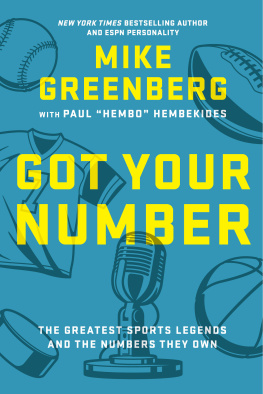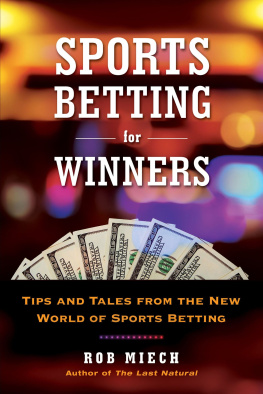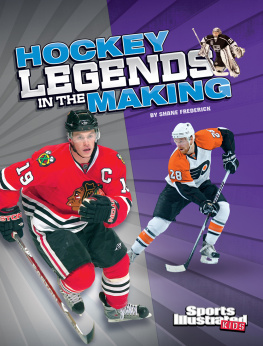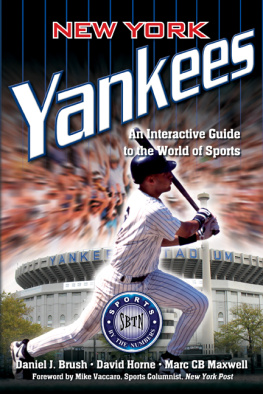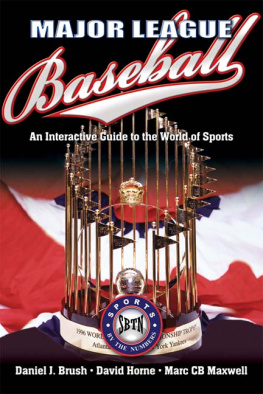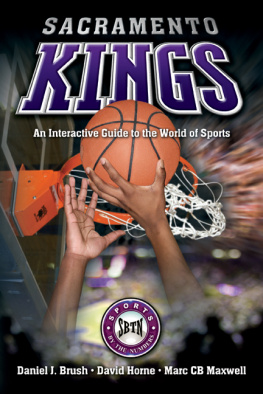Contents
Guide
The authors would like to acknowledge Sports Reference and ESPN Stats & Information as invaluable resources for the research that went into this book.
Copyright 2023 by Mike Greenberg
Interior illustrations 2023 Nathan Goldman for DKNG Studio
All rights reserved. Published by Hyperion Avenue, an imprint of Buena Vista Books, Inc. No part of this book may be reproduced or transmitted in any form or by any means, electronic or mechanical, including photocopying, recording, or by any information storage and retrieval system, without written permission from the publisher. For information address Hyperion Avenue, 77 West 66th Street, New York, New York 10023.
First Edition, April 2023
Hardcover ISBN 978-1-368-07356-1
eBook ISBN 978-1-368-09282-1
www.HyperionAvenueBooks.com
This one is for Stacy, Nikki, and Stephen, who are my inspiration.
And for my parents, who instilled in me my passion for sports and my love of books.
Greeny
This is for my father, Dany, who has written two books in English, his second language. Dad, your commitment to excellence in everything you do inspires me every single day
Hembo

The year was 1985, and I was a freshman at Northwestern University in Evanston, Illinois. The lecture hall was vast and dimly lit, the smell of coffee and nervous anticipation in the air. It was the first day of classesmy first day as a college student. The class was called Introduction to Philosophy. I was seated in the back, having carefully selected a spot behind a very tall man so as not to run any risk of being called upon. The professor entered from a side door I hadnt previously noticed and took his place beneath a giant screen. The room went silent as he shuffled papers at the lectern. After an extended moment, he tapped his microphone a time or two and then blew into it loudly.
My fellow scholars, he said. I want you to consider the following idea: that the only questions that are really worth asking in life are those to which we will never know the answer.
The following day, I dropped his class.
His idea was so foreign to my way of thinking, such complete anathema to my view of what makes life fun, that I simply could not allow myself to be subjected to whatever his next idea might be. All these years later, I still havent gotten over the first one.
You see, I am a sports talk-show host. In my job, there is no question that cannot be answered. In most cases those answers come loudly, immediately, and with considerable bombast. In fact, if there was a handbook for sports talk-show hosts, the first rule would be: No matter the question, always have an answer. The second rule would be: Your opinion is always right. And the third: In the event you are wrong, see rule number two.
I have been doing this job for more than thirty years, and in that time those rules have very much built nests in my sensibility. Taking a position on a topic in sports and being fully prepared to defend it is not just something I am accustomed to; it is my way of life. It is practically my reason for being.
In the three decades I have been building up that muscle memory, opining loudly on radio and television, the questions I am asked most frequently on golf courses, city streets, and in airports always begin: Hey, Greeny, who do you think is better
Not a day goes by that I dont hear those words. The waiter in the restaurant, the Uber driver, the guy behind me in line at Starbucks, they all want to know who I think is better. And, invariably, whomever I choose, they think I am wrong.
At their essence, sports lend themselves to the most good-natured debate you will ever encounter, because there is nothing in the world better than investing everything in something that means absolutely nothing. When someone asks me whether I think LeBron James is better than Michael Jordan, the consequences of my response mean nothingthere are literally zero stakesand yet both of us know that my answer also means absolutely everything.
That is the nature of sports conversation: heated debate with zero consequence.
I would know; Ive been doing it all my life.
And I love it.
Honestly, I wish more of the discourse in our society could be this way. Lord knows, our political discourse is hardly ever a fraction as polite, or productive, as the sessions being conducted every day on sports radio stations across states both red and blue. When I was a boy, I was taught that sports brought people together like nothing else, the old adage about the millionaire and the taxi driver on adjacent barstools watching the ball game as equals. It hasnt always been that way lately, of course, but I continue to believe sports debate remains about the most reasonable and respectful watercooler talk that we have in American society.
So, this book is about that, first and foremostabout the creation of a hundred sports debates that we can engage in respectfully. Which is to say, I will offer my opinions and you will likely agree with some of them and disagree with others. You will sometimes be convinced I am wrong. At those times, I ask you to please remember that mine is that rare genius that will not be fully appreciated until well after Im out of the picture.
I cant think of a better way to spend our time.
But this book is about something more than that as well, something much bigger. Because sports have always been about more than that, at least for me. These games that people play have always felt disproportionately meaningful in my life. Nothing makes me feel more comfortable, or more at home, than talking about sports.
You probably feel that way, too. If you were moved to buy this book, or someone was moved to buy it for you, it had to be with the knowledge that all this stuff means as much to you as it does to me. In that way, sports conversation is something far greater and more meaningful than how it is typically portrayed. It is something that taps into the deepest parts of our souls. It is about our connection to all that has come before, and all those who were with us to experience it. Sports are about our childhood, our family, our youth.
Simply put: Sports are about memories, which by definition took place in the past, which explains why for sports fans the past was always the best time. This is a universal rule that applies to every sports fan, always has and, I believe, always will.
I can prove it to you. Tell me how old you are, and I will tell you how you will respond to almost any sports question. Seven times out of ten I will be right. (And you will be wrong on the other three.)
For example, my father would always drop Oscar Robertson into any discussion about how good Michael Jordan was, in exactly the same way I now drop Michael into any conversation about how good LeBron James is. I guarantee you that thirty years from now, my son will do the same for LeBron, when his son or daughter talks about how good whoever becomes the next Greatest Of All Time (G.O.A.T.) is. Invariably, those discussions will ascend into arguments.
(Note: ascend, as opposed to

